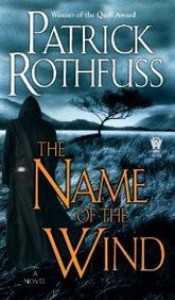
REVIEW: Name of the Wind (The Kingkiller Chronicles) by Patrick Rothfuss

There has been a lot of positive attention for this book, and I must say that it's warranted. The story, in short, is about a man with a an infamous and near mythical reputation that tells his life story.
The book consists out of two distinct story lines. The first, told in third person, concerns the events and the 'current' time in which the main character relays his life story. The second is the story told by him, which is in first person. These flashbacks that show the main character's life make up the bulk of the book.
At the core, the life story is a coming of age adventure from a gifted man in a mystical world. This intertwines nicely, as the 'current' timeline adds some spice in the form of describing some events that happened during his life.
As I wrote about here, there is risk in doing so, but Rothfuss deftly avoids the problem by making it clear that a lot of the 'predictions' are wildly exaggerated falsehoods, brought on by the main character's infamy. Furthermore, the predictions are in fact hindsight, which means the flashback version of the main character is unaffected by them, leaving character agency intact. To the reader these events become more of a mystery; you want to see how much of what is hinted is true and how it happens.
(show spoiler)
One thing I liked about it was it's approach to magic. Rather then making it a nebulous force with unclear working, here there are various sorts of 'magic' that each follow clearly delineated rules. This is something I see often in recent years and wholly applaud. Having a properly established framework for magic use is preferable to the randomness of magic in older fantasy stories, as the second frequently leads to it being used as a deus ex machina.
Reading other reviews, I frequently see the main character labelled as a Mary Sue, and while I understand why one might think that, I only partially agree. The main character is indeed exceptionally gifted, but not so much as to shield him from his own mistakes, nor does everyone in his environment love him without reserve. A lot of his amazing feats, turn out to be not so amazing at all, and he frequently stumbles into them by chance more often than not. Rothfuss is dancing a fine line with the accidentalness of said feats, yet he managed to end up on the right side so far.
Final verdict
A solid representation of the current state of the genre and one I wholly recommend for you to read unless you don't like adventure romps.
 1
1


